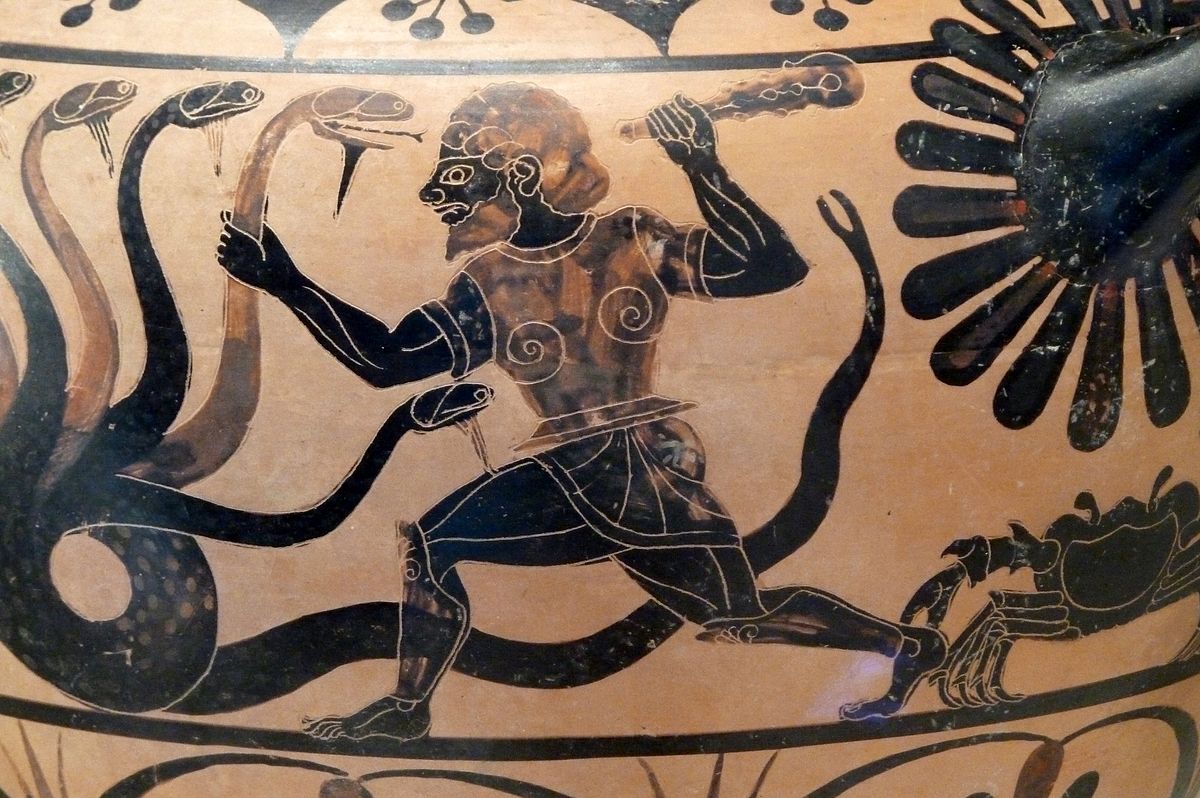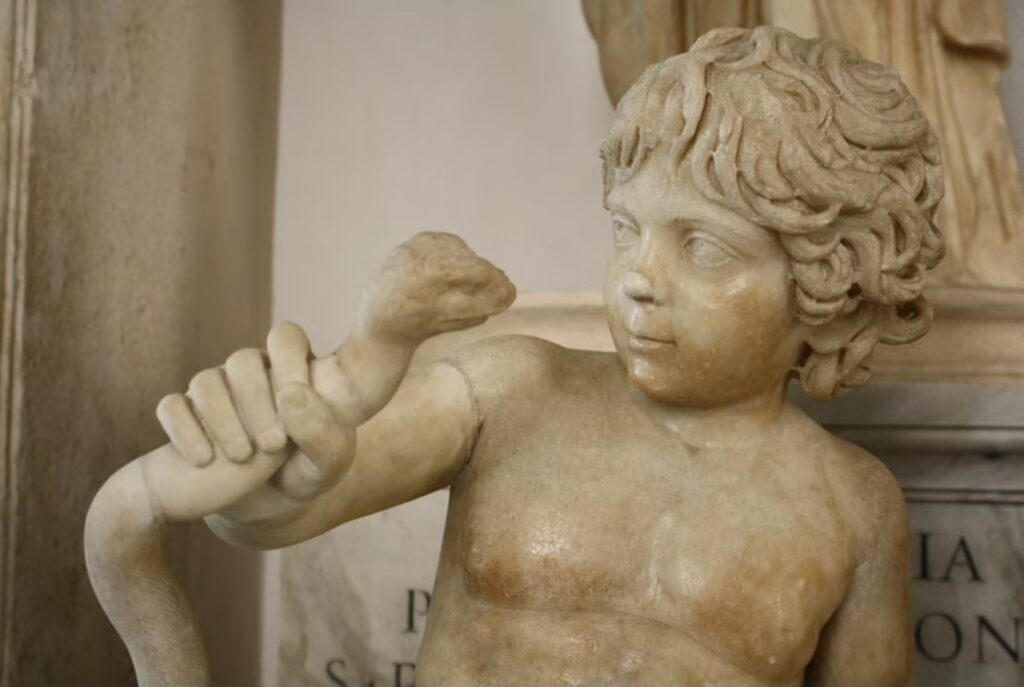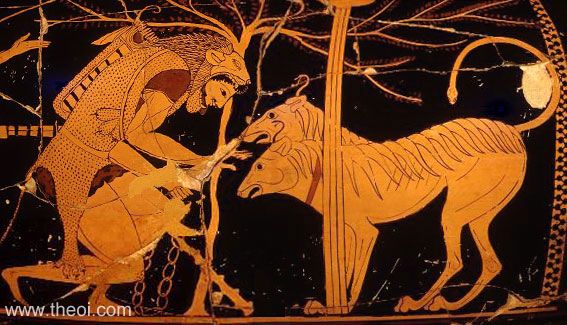by Sean Kelly, Managing Editor, Classical Wisdom
He’s the greatest of the Greek heroes.
There’s probably no other Greek figure that has had more movies, TV shows, and other adaptations based on their tales. Although, in a lot of these cases, it’s not the character’s original Greek name, Herakles, that is used. Rather, we may know him better by his Latinized name of Hercules, as used by the Romans.
What’s in a name, though?
Quite a lot, actually.
In Greek mythology, a character’s name can have very resonant meanings. A brief example would be Antinous from the Odyssey, one of the leaders of the feckless and wasteful suitors. With Odysseus having left his home of Ithaca twenty years previously to fight at Troy, Antinous hopes to wed Odysseus’ wife Penelope in the Greek hero’s absence. His name is a compound of anti, meaning “opposed” (a meaning it still holds today), and nostos, the Greek word for homecoming. Antinous’ name reflects the role he plays in the Odyssey – he opposes the homecoming of Odysseus. The French academic Nicole Loraux described such instances of Greek names as being ‘micro-narratives’.
Similarly, Herakles’ identity is encoded within his name. Herakles isn’t even his real name. He is born Alcaeus, and later took on the name Herakles himself. But why?
The name Herakles is a compound of the name of the goddesss Hera and the word kleos, an important concept in Greek society, meaning glory or fame. Herakles’ name, therefore, literally means “the glory of Hera”.
Yet this is deeply ironic. Hera is both Herakles’ stepmother and his aunt, but she is not loving towards her demigod relative. Rather, she is furiously antagonistic towards Herakles. Even as a child, she sent snakes to kill him, which he strangled in his cradle. This is because Herakles is one of many of Zeus’ illegitimate children, having been born of the mortal woman Alcmene, a granddaughter of Perseus. As a living symbol of Zeus’ infidelity, the Greek hero is an object of relentless scorn to Hera. The queen of the gods, therefore, dedicates many efforts to destroying Herakles.
Even before he was born, Hera sought to undermine him. Before the birth of Herakles, Zeus made a proclamation that the descendent of Perseus born the following day would become King of Mycenae. Hera then contrived to delay the birth of Herakles, so that her favoured figure, Eurystheus, could instead be born first, thus allowing him to become King, instead of Herakles. This established a dynamic which is invoked in the Iliad as a reflection of the distinctions between Achilles and Agamemnon. Achilles, like Herakles, is the figure of greater heroism, yet is socially inferior to the much less heroic figure of Agamemnon (or his counterpart, Eurystheus).
As an adult, it is Hera who caused madness to descend on Herakles, leading to him killing his children (and in some versions, his wife). This, in turn, led him to seek atonement by visiting the court of his cousin and champion of Hera, King Eurystheus, who then sends Herakles on his famous twelve labours.
It is on these labours that Herakles battles such enduring figures of myth as the Hydra, or Cerberus, the three-headed dog guarding the entrance to Hades. Yet, it is from these hardships that he gains his glory. Her attempts to destroy Herakles ultimately backfire, and inadvertently grant the hero greater and greater renown. Herakles, therefore, draws his glory (kleos) from Hera. Herakles chooses his name to reflect this.
The linguistics of the name Hera itself open up further layers. The name Hera is linguistically related to two other very relevant Greek words – the first of which is hōrā (plural hōrai), meaning ‘season’ or ‘the right time’. This is the word from which we get the modern word hour. The name Herakles, therefore, also carries this connotation within it. He is, in a sense, ‘the glory of the right time’. This again is ironic, as Herakles was born, seemingly, at the wrong time. Yet, just as Hera’s other attempts to destroy him backfired, so did this original attempt to undermine him. His late birth is ultimately what put on him on the path towards the glory gained in the twelve labours. Maybe he was born at the ‘right’ time after all.
These themes of time and ‘untimeliness’ with regards to the myths of Herakles are explored further in Euripides’ play Herakles, one of a number of Greek tragedies dealing with the demigod. It is somewhat similar to his play on Helen, in that it presents a notable departure from the more famous versions of the tale. Strangely, Herakles is presented as having returned from his labours before the frenzy of madness that causes him to kill his family takes place. Although this may seem unusual at first, it is part of a broader examination of the role of time and timing within the myths of Herakles.
Much like one of Euripides’ most famous plays Medea, Herakles deals with the horror of the violence of Homeric warfare entering the world of the oikos, or home. When Herakles is in the midst of his frenzy, he believes that he is fighting his enemy Eurystheus while committing these acts of violence. Within the Homeric code of Euripides’ own day, Herakles actions would be justified by being on a battlefield, yet they are, naturally, horrific when they occur within the home. According to the Homeric code, Herakles actions themselves weren’t wrong – the timing was simply wrong. Euripides, it seems, doesn’t find fault with Herakles himself, but with the prevailing moral code of his day, where the same actions can be rendered just or unjust by something as arbitrary as timing. This reinforces the irony of the hero’s name having the connotation of ‘the glory of the right time.’
Utimately, Euripides’ version of Herakles is granted a different sort of atonement, through the friendship of Theseus, and by implication, the city of Athens. To Euripides, it seems that it wasn’t violence on the battlefield or great deeds that made Herakles great, but rather his innermost character of nobility and decency, the qualities that ensure his friendship with Theseus.
Finally, Hera is also linguistically connected to the Greek word hērōs, meaning hero. This means that the name could be read as “the glory of the hero.” A fitting title, then, for the most enduring of Greek heroes.
It turns out, there’s a lot in a name!












No comments yet. You should be kind and add one!
Our apologies, you must be logged in to post a comment.